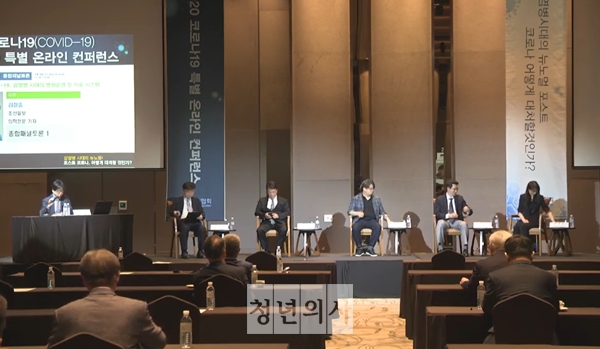Korea could respond to the new coronavirus outbreak exceptionally well compared to other countries because the nation learned lessons from the Middle East Respiratory Syndrome outbreak in 2015, experts said.
Their comments came at the Korean Hospital Association’s “2020 Korea Healthcare Congress Covid-19 Special Online Conference” on Wednesday. At the online event, experts discussed how the nation should deal with the post-Covid-19 in these times when infectious diseases have become a new normal.

“The MERS outbreak five years ago has been engraved on the minds of the public, the government, and the medical community. After MERS, the Korea Centers for Disease Control and Prevention received lots of audits and punishments,” said Professor Kim Woo-ju of the Infectious Disease Department of Korea University Guro Hospital.
There was a sense of desperateness that Korea should not fail again, and this has made the nation cope with Covid-19 well, he added.
Despite the success so far, the nation should find problems, analyze them, and brace for a secondary outbreak of Covid-19 in the autumn season, Kim noted.
The authorities could shift the strategy to “everyday life quarantine” and gradually allow school opening from high school seniors to junior and elementary students. Still, a resurgence of Covid-19 would force schools to close again, he went on to say.
“As the summer is coming up and the outbreak is under control, it is possible that we can allow senior high schoolers to attend in-person classes first. But high-risk children, including infants and those with asthma and diabetes, need special protection,” Kim said. “The school reopening should come in gradual steps, but we can’t guarantee that the outbreak will not occur in September or October. We might have to close schools again.”
Lee Wang-jun, chairman of Myongji Hospital and the leader of the Working Group of the KHA's New Coronavirus Emergency Response Headquarters, said lessons learned from the MERS outbreak five years ago helped Korea respond to Covid-19 efficiently.
“The reason Korea responded well to Covid-19, unlike advanced countries, was the nation had experienced the MERS outbreak five years ago. Korea received ‘a strong live vaccine,’ not inactivated vaccine, five years ago,” Lee said. “As the country also dealt with SARS (Severe Acute Respiratory Syndrome) 17-18 years ago, Korea could come up with the right response.”
Immediately after the Covid-19 outbreak, hospitals scrambled to install separated examination facilities even before the KCDC or the KHA announced guidelines, according to Lee. After the KHA formed an emergency response headquarters, the association learned that 560 hospitals were already operating isolated examination facilities. Based on the four months of Covid-19 experience, hospitals should prepare for a recurrence of an outbreak, Lee pointed out.
“Korea ranked second in the number of MERS patients, after the Middle East region, but failed to release a paper about it,” Lee said. “I repeatedly voiced for systematic management of patient information, clinical data, and samples for a good research paper. However, we failed this time again.”
In contrast, China published a report on 70,000 Covid-19 patients on Feb. 25 in just two months after the first confirmed case, along with the World Health Organization. The country released the analysis on the clinical data in the Journal of the American Medical Association, Lee pointed out.
“While China released over 800 Covid-19 papers, Korea, just over 20. The nation is dealing with Covid-19 well, but I feel sorry that Korea did not accumulate data for medical evidence,” he said.
The health authorities should support hospitals to organize Covid-19 clinical data systematically, Lee added.

